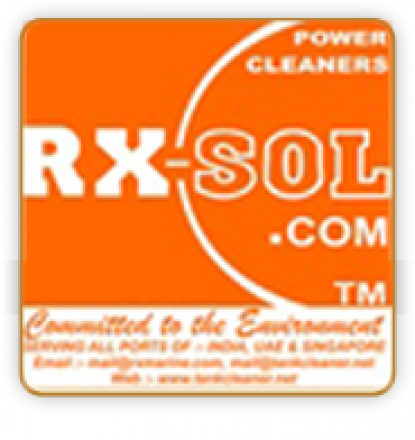Buffer Cleaner
Oman Chemical is leading one Largest Supplier, Manufacture a
Product Code: RXSOL-43-4301-109

Chiller Treatment CORROSION & SCALE INHIBITOR
Corrosion Inhibitor for Water Systems having unique formulation with highly concentrated liquid cooling treatment compound, ferrous & Non ferrous corrosion inhibitors, antiscalants, dispersant and buffer solution of non carbonate. Usefull for use in high or low temperature closed cooling water systems for the prevention of corrosion and scale formation in internal combustion engines, compressors, chiller system and DG sets. Protects all metals including cast iron, mild steels and copper. Recommended ppm levels are easily controlled by standered RXSOL test kit Nitrite / Chloride.
The stable protective microfilm prevents corrosion caused by electrolytic action and the alkaline nature of this product prevents acid attack.
The stability of the added polymers are very useful for water treatment processes. Such polymers with low molecular weights cannot only inhibit calcium, magnesium, and silica scale in cooling towers and boilers, but also help corrosion control by dispersing iron oxide.
Prolongs the life of equipment by keeping it scale and corrosion free. Since RXSOL-40-4001-025 is alkaline, it will suppress acid corrosion, which would otherwise result in sever pittings. It improves cooling efficiency by maintaining clean heat transfer surfaces , from Radiators, DG - sets, Closed Cooling and chiller System.
FIELDS ::: --- Suitable for use in closed water cooling systems, ice melting systems and transformer cooling systems. The product may be used in all kinds of diesel & petrol engines, compressor or heating cooling water circuits.
( Used as a corrosion inhibitor for all ferrous and non-ferrous metals found in water systems )
Refer to technical datasheet.
GENERAL RECOMMENDATION : ( The dosage chart may be used as a guide to adjust treatment to obtain the optimum level.)
| Nitrite (as PPM NO2) | 0 | 100-200 | 300-600 | 700-900 | 1100-1300 |
| RXSOL-40-4001-025 / 1000L | 8.0 | 7.3 | 7-8 | 5-7 | 1.5-3.5 |
NOTE ::: -- If nitrite level becomes 1440-2400 then doses should be ZERO.
The initial dosage for an untreated system is 8 liters of product per 1000 liters of water. Such a dose will bring nitrite levels over 1200 ppm. Maximum nitrite level is considered to be 2400 ppm. Frequent tests should be carried out in order to maintain pH values within the limit (8.3-10.0), while levels of chloride should be maximum 50 ppm.
Initial dosage for an untreated system is 9 litres of RXSOL-40-4001-025 / 1000 litres of untreated distilled water. This will bring the treatment up to the minimum level of 1000 ppm nitrite. For best result and prolonged engine life add RXSOL-40-4001-025 every 500 -6500 km. or 250 to 300 hours of running time or every 2 month interval. Specially designed for use in water systems of internal combustion equipment. pH should be maintained between 8.3 and 10 by the treatment.
RXSOL-40-4001-025 will react with sludge and in most cases, facilitate sludge gradual removal. On badly fouled systems with oil or scale, a prior degreasing by using DEGREASER HEAVY DUTY or descaling by using DEGREASER HEAVY DUTY, SCALE REMOVER LIQUID or SCALE REMOVER POWDER is highly recommended.
• Excellent corrosion inhibitor for cooling water
• Minimises metal oxide deposits
• Protects ferrous and non-ferrous metals
• Compatible with glycol-based antifreeze
• Reduces cleaning & maintenance costs
• Cost effective, easy to apply and use
RX MARINE INTERNATIONAL are continiously working in water treatement sector, And developed many unique product to avoid corrosion and scale depositon in cooling water system. Here I wants to keep our experiment results with you.Corrosion inhibitor for closed cooling systems containing molybdate/phosphonate ( RXSOL-40-4018-025 ). Sodium molybdate has the advantage in that the dosing of lower ppm's of molybdate allow for lower conductivity of the circulating water. Sodium molybdate at levels of 50-100 ppm offer the same levels of corrosion inhibition that sodium nitrite at levels of 800+ ppm. By utilizing lower concentrations of sodium molybdate, conductivity is kept at a minimum and thus galvanic corrosion potentials are decreased.
Before testing of Nitrite level, Here is some point and guideline, what you need to do. : 1 take the following readings; pH, TDS (uS), and nitrite level.and record. 2 add the Chemical your are using. 3. wait for a period of time for the sysem to circulate.
for a period of time.
If the TDS and Nitrite drop you have a leak/ unknown makeup. if the TDS stays stable and the nitrite drops you have a biological problem. Bacteria that convert nitrite to nitrate.
Solution ::: Use DI water in place of general water, And also use. Algaecide to control Bacterial growth inside water system ... http://rxmarine.com/Biocide-
Also refer this link http://rxmarine.com/engine-water-treatment-corrosion-inhibitor